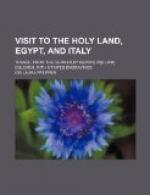The supply of water is also very badly managed. Every morning, immediately after sunrise, a few skins of water are brought for the purpose of cleaning the cooking utensils; at nine o’clock in the morning and five in the afternoon a few camels come laden with skins of fresh water, which are emptied into two stone tanks in the courtyard. Then all fill their cooking and drinking vessels, but in such an untidy way that I felt not the slightest inclination to drink. One man was ladling out the water with a dirty pot, while another dabbled in the tank with his filthy hands; and some even put their dirty feet on the run and washed them, so that some of the water ran back into the tank. This receptacle is moreover never cleaned, so that dirt accumulates upon dirt, and the only way to obtain clear water is by filtering it.
On the second day of my residence here I was exceedingly surprised to observe that the courtyard, the staircases, the rooms, etc. were being cleaned and swept with particular care. The mystery was soon solved; the commissioner appeared with a great stick, and paused at the threshold of the door to see that the linen, clothes, etc. were hung up to air, the books opened, and the letters or papers suspended by strings. No idea can be formed of the stupid nervous fear of this commissioner. For instance, on passing through the first room on his way to my apartment, he saw the stalk of a bunch of grapes lying on the ground. With fearful haste he thrust this trifling object aside with his stick, for fear his foot should strike against it in passing; and as he went he continually held his stick in rest, to keep us plague-struck people at a respectful distance.
On the seventh day of our incarceration we were all sent to our rooms at nine o’clock in the morning. Doors and windows were then locked, and great chafing-dishes were brought, and a dreadful odour of brimstone, herbs, burnt feathers, and other ingredients filled the air. After we had been compelled to endure this stifling atmosphere for four or five minutes, the windows and doors were once more opened. A person of a consumptive habit could scarcely have survived this inhuman ordeal.
On the ninth day the men were drawn up in a row, to undergo an examination by the doctor. The old gentleman entered the room, with a spy-glass in one hand and a stick in the other, to review the troop. Every man had to strike himself a blow on the chest and another in the side; if he could do this without feeling pain, it was considered a sign of health, because the plague-spots appear first on these parts of the body. On the same day, the women were led into a large room, where a great female dragoon was waiting for us to put us through a similar ceremony. Neither men nor women are, however, required to undress.
A few hours later we were summoned to the iron grating which separated us from the disinfected people. On the farther side were seated several officers, to whom we paid the fee for our rooms and the keepers—the charge was very trifling. My room, with attendance, only cost me three piastres per diem. But how gladly would every traveller pay a higher price if he could only have a table and a few chairs in his apartment, and an attendant who understood what was said to him!




